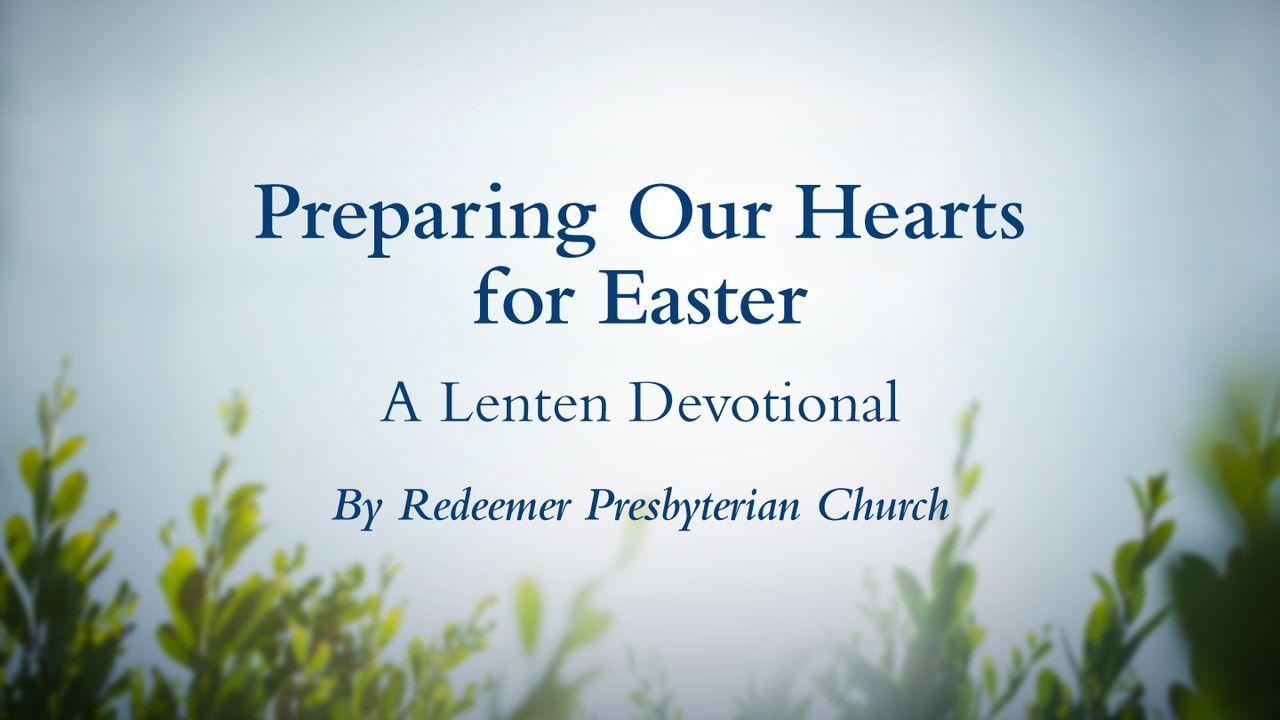Preparing Our Hearts for Easter: A Lenten DevotionalSample

"Day 19: The Servant Israel"
How do we know God is good? Isaiah 49 begins as a letter sent out to all nations (v. 1, “the coastlands … and peoples from afar”), but it is being read and heard by the people of Israel. Therefore, the writer is essentially talking to everybody. The Jews had been taken into exile and longed to be brought back and they wondered where that salvation would come from. Isaiah makes the wondrous claim that “the servant” (v. 3), who has been prepared for this very hour, will be the one who brings the people back, but the manner would not be through military might, but through the power of his mouth (v. 2). That is, what he says and does will bring real salvation, not just physical deliverance.
The twist comes in the fact that this mysterious servant is named Israel (v. 3) — and while he is a person, he is the ideal person who embodies all the characteristics the nation of Israel should have had. For this text we need to remember that the nation of Israel was meant to have been a blessing to all nations (Genesis 12), a command they never fulfilled. Who will do so? This man would have to be perfect to be the ideal version of Israel, and then save not just the Jews — for God to be really glorified (v. 3), he will also have to be “a light to all nations” (v. 6).
We know God is good because he saw his own wayward people and all the rest of the world and brought them back into relationship with him (v. 5). How? Our translation says in v. 6, “that my salvation may reach the ends of the earth,” but the Hebrew grammar reads more plainly, “to be my salvation to the ends of the earth.” Jesus as the servant is not merely the means to God’s salvation but he is that salvation — through his death and life.
Prayer
Lord Jesus, suffering servant and Redeemer, you have brought us back into relationship with you by being our salvation, purchasing us with your life, ransoming us from certain death. Give us hearts of flesh, warmed by the truths of your goodness found in the certainty of your love for us through your death and resurrection. In Christ’s Name, Amen.
Copyright (c) 2012 by Redeemer Presbyterian Church.
How do we know God is good? Isaiah 49 begins as a letter sent out to all nations (v. 1, “the coastlands … and peoples from afar”), but it is being read and heard by the people of Israel. Therefore, the writer is essentially talking to everybody. The Jews had been taken into exile and longed to be brought back and they wondered where that salvation would come from. Isaiah makes the wondrous claim that “the servant” (v. 3), who has been prepared for this very hour, will be the one who brings the people back, but the manner would not be through military might, but through the power of his mouth (v. 2). That is, what he says and does will bring real salvation, not just physical deliverance.
The twist comes in the fact that this mysterious servant is named Israel (v. 3) — and while he is a person, he is the ideal person who embodies all the characteristics the nation of Israel should have had. For this text we need to remember that the nation of Israel was meant to have been a blessing to all nations (Genesis 12), a command they never fulfilled. Who will do so? This man would have to be perfect to be the ideal version of Israel, and then save not just the Jews — for God to be really glorified (v. 3), he will also have to be “a light to all nations” (v. 6).
We know God is good because he saw his own wayward people and all the rest of the world and brought them back into relationship with him (v. 5). How? Our translation says in v. 6, “that my salvation may reach the ends of the earth,” but the Hebrew grammar reads more plainly, “to be my salvation to the ends of the earth.” Jesus as the servant is not merely the means to God’s salvation but he is that salvation — through his death and life.
Prayer
Lord Jesus, suffering servant and Redeemer, you have brought us back into relationship with you by being our salvation, purchasing us with your life, ransoming us from certain death. Give us hearts of flesh, warmed by the truths of your goodness found in the certainty of your love for us through your death and resurrection. In Christ’s Name, Amen.
Copyright (c) 2012 by Redeemer Presbyterian Church.
Scripture
About this Plan

What is Lent? It is a time in which we anticipate the victory of the light and life of Christ over the darkness of sin and death. As we journey from Ash Wednesday to Easter, we are reminded of the reality of our frailty and God’s redeeming grace.
More
This devotional was created by the staff of Redeemer Presbyterian Church and was originally posted on www.redeemer.com in 2012. Used by permission.
Related Plans

Reading With the People of God #14 Proverbs

Write Your Faith: 3 Days of Journaling

The Radiant Mom: 10 Days to a More Joyful, Christ-Centered Home

The Last Half Hour: When Waiting Becomes Glory

Prayers for a Mother's Day: Powerful Prayers for Busy Moms

Healing the Wounds of Rejection

Forgive Them Too??

Lessons From Ezra

Pain to Peace: A Man's Path Past Pitfalls
